#the tale of the ronin and the bride
Text

Mizu, trying her best to express deep feelings of admiration towards another: I WILL CUT THINGS IN HALF FOR YOU!
#blue eye samurai#Blue Eye Samurai Mikio#The tale of the ronin and the bride spoilers#Blue Eye Samurai spoilers#Blue Eye Samurai Mizu#meme#'bein silly#trade offer meme#my art#The Tale of the Ronin and the Bride#I had to pause The Tale of the Ronin and the Bride in order to make this in a fit of delight#no spoilers pleaaaaase#(I know from context it ends badly but y'know)#Also I am aware it was probably some kind of soup + salad dish!#I just got caught in the sillies when I saw Mizu enthusiastically chopping carrots and stuff to impress him
85 notes
·
View notes
Text
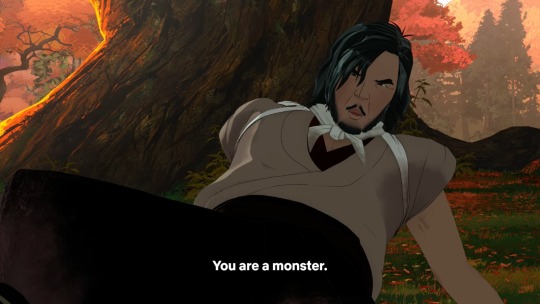
She wasn't, not until he came along.
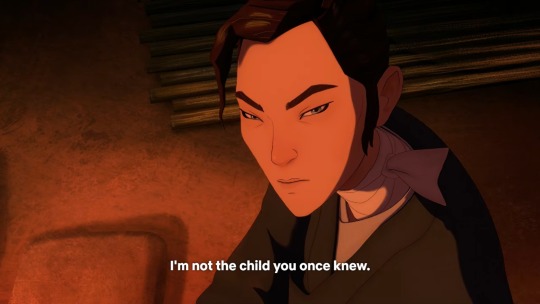
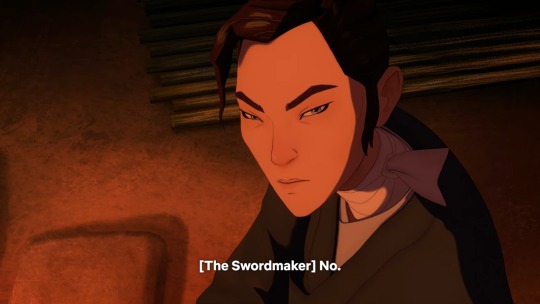
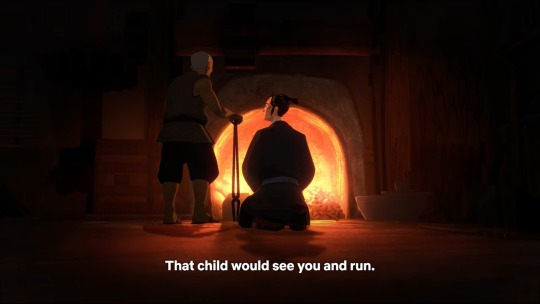
But it became a self profiling prophecy. And now, even when someone can accept her, she'll ruin it.
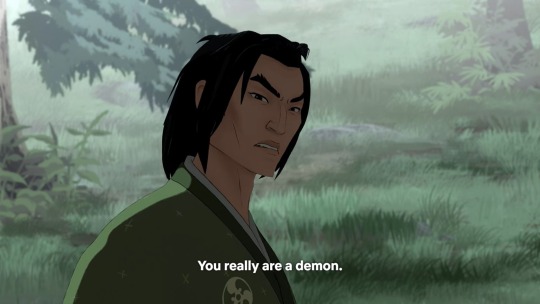
There's no room for that. She's too far gone.
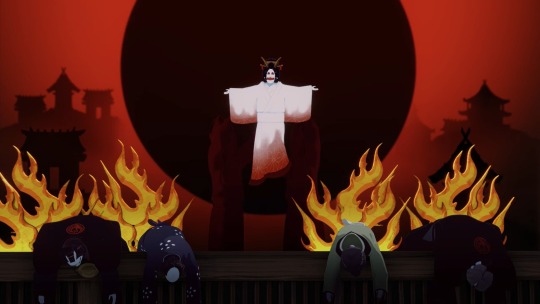
#BTW Taigen is a racist and racism is bad obviously but here he had a reason to be had at her#just in case someone tries to put words into my mouth#Anti mikio#mikio blue eye samurai#mikio#mizu blue eye samurai#mizu meta#mizu#the tale of the ronin and the bride#nothing broken#taigen blue eye samurai#taigen x mizu#taizu#taimizu#mizu x taigen#taizu meta#bes meta#bes mizu#bes#blue eye samurai#bes talk
26 notes
·
View notes
Text
Guys I need to be a hater for a minute I'm so sorry.
If you have like a deep attachment to the Blue Eye Samurai episode "the tale of the ronin and the bride" look away now cause I'm about to rip into it. Also spoilers ahead for the whole series.
Okay, to preface, I am generally a hater of flashback sequences, so as much as this is a criticism of this episode, it's also a crit of most flashback sequences in film and television. I am also much more willing to let it slide when it's used for comedic purposes like the beginning flashbacks in Psych or clipshow episodes in IASIP or Community. Also, this is all my opinion, you are free to disagree with me all you want and that's totally fine. Apparently I'm the only person who thought this episode kinda sucked so I fully expect to be on my own here. I would like to present my argument nonetheless
Ok disclaimer done, now to get into why I think that the use of flashbacks and framing devices in this episode of BES was a poor choice and pisses me the hell off. Formatted into a numbered list.
It takes the tension out of the main fight. The fight scene in this episode is easily one of the best in the series, but the constant cut aways draws interest away from the fight and seems to equate cliffhangers with tension. On some occasions that would be fine. The bits where they cut to the other characters totally make sense and add to the tension of the fight overall as our minds are still on the fight and the show is not forcing our attention to something that's much less engaging than Mizu fighting like a hundred guys. It also decenters the actually interesting character dynamics we get to see in this episode by putting the focus on the relationship between Mizu and some guy we don't know. There could have been so much more development on the relationship between Mizu and Akemi or Akemi and Ringo which would have been so cool because they don't interact much before this episode, based on the finally, will end up being important relationships later on so why not spend your time showing us that? Why linger on this random guy from the past?
Flashbacks are lame and I don't like them. (This is my list so I get to be petty if I want to.) As previously mentioned, I am generally a hater of flashbacks. I think it's a boring way to relay a character's backstory and motivations to an audience. It often ends up over-explaining things that don't actually need to be explained and take away from the flow of the story. Ofc course, some flashbacks are better than others, for example, I think the flashbacks showing Mizu learning from the Swordfather are more interesting because learning how Mizu learned to fight and where her anger against her father stems from is actually interesting and very relevant to her actions. However, since we did see where Mizu's quest for revenge and fighting ability came from, why do we also need to see her get betrayed by a past lover on screen? Why did we need to see it happen beat for beat in the form of a flashback? Wouldn't it have been more interesting if we got to see her come across her ex in the actual plot of the story and not the metanarrative? Same goes for her mother? Why put the story on hold to tell us this when you could have made it part of the story?
We don't actually need to know every single thing about a character's traumatic backstory, and that's okay. This whole series of flashbacks fell flat for me because I already understand that Mizu is on a quest for revenge, y'all did a great job of conveying that by giving her a one track mind about it. I really don't care about what made her heart cold, isn't being jilted by everyone you've ever met enough to do that to a person? Why does she need a man to drive her to rage? Isn't being a member of an oppressed class enough to do that? She's a woman in an extremely patriarchal society and a member of a racial minority in a racist ass society, that's as good of a motivation as any. The idea that she needs more of a reason to hate the world is frustrating to say the least. In HBomerguy's video "Sherlock is Garbage and Here's Why", he discusses how Steven Moffatt fumbled the character of Sherlock by going back and showing his childhood, as he did with Jackman in Jekyll. In my opinion, if the only way you can think to reveal the character and motivations of a character is via flashbacks, you need to go back to the writing room and think of something else because there are always better ways to do it.
The romance plot is god fucking awful. This is probably my most biased point because I am so picky when it comes to romance plots in non romance stories. I am not against the concept of having romance subplots in non romance stories, and I am actually a romance lover, so it's not bad that there is a romance, this one just sucks dick and balls. Due to the format of it only existing in flashbacks there is absolutely no time for the audience to see the characters have legitimate chemistry or cute moments, so they try to use shorthand like the characters laughing together or whatever, but it falls flat because this is literally the first time we are seeing Mizu's husband and we know almost nothing about him. Every scene with them is super awkward and forced. There's no time for the audience to develop feelings or opinions on him, to the point that I am not using his name because I legit don't know what it is. Again, why not have Mizu come across her ex on her journey and have it be a source of conflict in the story? The way it's currently laid out is so goddamn boring that I was skipping through the parts where they weren't doing shit to get back to the good part (fighting).
Why are men? Must every woman have an on screen romance with a guy? Are we not allowed any other motivation? This isn't just me being a lesbian, this is genuinely such an annoying thing in media. There are so many guys who are on revenge missions who don't need to have their heart broken on screen too explain why they're murderous. Why did this need to happen to Mizu? We couldn't have had fmc with the same insane drive as Anton Chigurh or like the Basterds from Inglourious Basterds? There are basically no women in media who get to be just fucking nuts sans a tragic backstory with a guy and up until this episode, Mizu was one of them. But then we have to see how ooo actually she's a killer because a man broke her heart because god forbid women be angry at their material conditions. I'm not calling the writers misogynists or anything, I just think they took the boring way out in this episode.
The 'mother' reveal. WHYY NOT JUST HAVE THEM REUNITE IN THE BROTHEL OR SOMETHING?!?! This is the most frustrating thing. Her being alive during the flashback only to be killed by the end is a crock of shit if you ask me. It doesn't really affect anything because Mizu doesn't feel any different about her mother before and after the end of the episode BECAUSE IT ALL HAPPENS BEFORE THE STORY! If they had met during the timeline, we could have seen more development of the relationship between Mizu and her mother, but we already know that Mizu misses her mom because that's how she went into the episode. It was already explained in other episodes. Also by the end of the episode, she's still dead so what was the point of the reveal? If she had remained alive, Fowler's reveal that her mother is not her birth mother could actually change their relationship in an interesting way and could create intercharacter conflict which could be fun and cool idk.
The play framing device. I'm not too mad at this, it just feels kind of redundant given that it tells the same story as the flashbacks. I would have preferred they just stuck with this over the inclusion of the flashbacks because it's a lot more visually interesting and less on the nose. I do think that shifting Mizu from being the ronin to being the bride is lame, but that's just because it feels a lil heteronormative to me. Why does she havee to be the girl character in the play? Let her be the man, it's fine actually. I feel like it doesn't give us new information either because we go into it knowing that Mizu is violent and gets called a demon, then by the end Mizu is violent and gets called a demon, so again I think it was a little pointless.
I think that's all of my grievances, so here's some final thoughts. I really liked Blue Eye Samurai overall, I just think that this episode really fumbled the bag. Looking at reviews of the episode, it seems like most other people really liked it and I'm on my own here, but that's fine. I stand by what I said and will proudly hold my status as a hater up high. There are so many more interesting ways the show could have spent its time and I think it's such a shame that it fell back onto such boring storytelling. I also have my gripes with the way that the Swordfather flashbacks played out, but I think that it has a little bit more relevance than the time that Mizu was married so don't think I'm being selective in my hatership. I also have some very specific gripes with the way that this episode affects Mizu's relationship with her gender and sexuality in a really stupid way, but those are largely due to me projecting so I will not get into it here.
Once again, if you really like this episode, that's great, I am so glad. There are some parts I really like. The fight scene is awesome and I really like the parts where we get to see Akemi being the badass that she is. I wish there was more of that. As always, Ringo is the best guy ever and I love him, it's cool to see the way that he stands up for himself when Mizu does something he disagrees with. I just don't understand why we got so sidetracked by something as unimportant as an ex-husband. Usually I understand the concept of show don't tell, but if the only way you can think of to show us that is flashbacks, try again.
Anyway, I hope this makes sense and that you guys get what I'm putting down. Feel free to argue with me if you want, I'd like to understand why people like this episode so much given that I had such a negative reaction to it.
#I am also a butch lesbian Mizu truther but that's MY problem#blue eye samurai#mizu blue eye samurai#the tale of the ronin and the bride
7 notes
·
View notes
Text
Argh I'm rewatching Blue Eye Samurai - Tale of the Ronin and the Bride and came to the painfully conclusion I felt a while ago but didn't want to confirm. When Mizu said she didn't need love, friendship or weakness, she lowers her eyes right after saying weakness. I swear, she's looking at the absence of Ringo's hands. She's calling him weak and a burden. Not only did she just kill a kid (after killing a defenceless woman for a contract) and betray Akemi in a way very similar to how Mikio betrayed her (and as a pretense her préjudice that Akemi's life as a noblewoman is "better for her", so that she knows better than Akemi about her place), but she's calling Ringo a burden, a weakling - him who has always been and wanted to be useful and great, his own person. And specifically for his disability it seems. Oh man oh man that's dark.
And obviously a pure hearted soul like Ringo isn't standing for this.
19 notes
·
View notes
Text
blue eye samurai is making me fucking crazy. the gender! the Gender! list of shows made for trans people
#got to ‘the tale of the ronin and the bride’ and OUGH! OUGHHHHGHH#get out of my face what a MASTERCRAFT#blue speaks
4 notes
·
View notes
Text
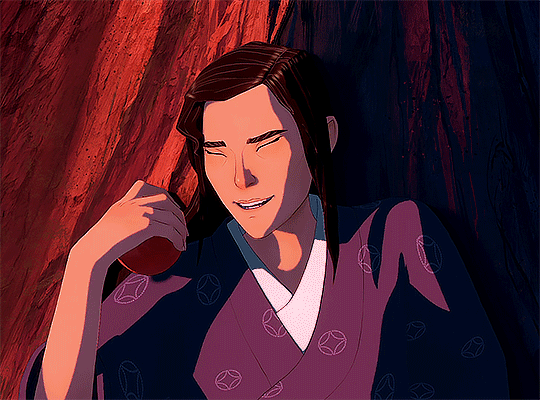
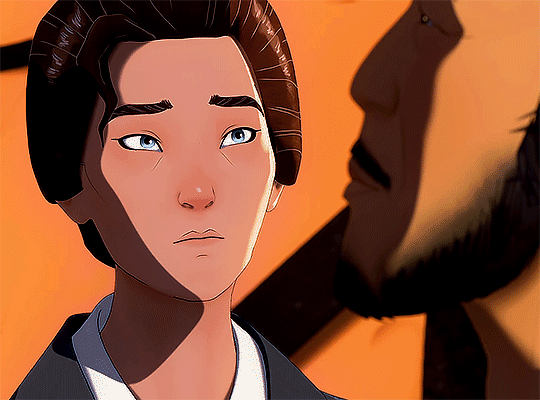
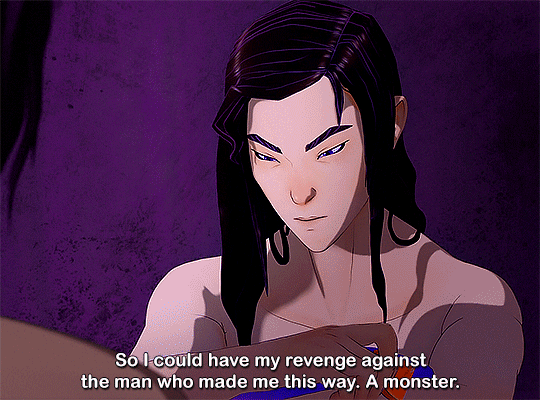
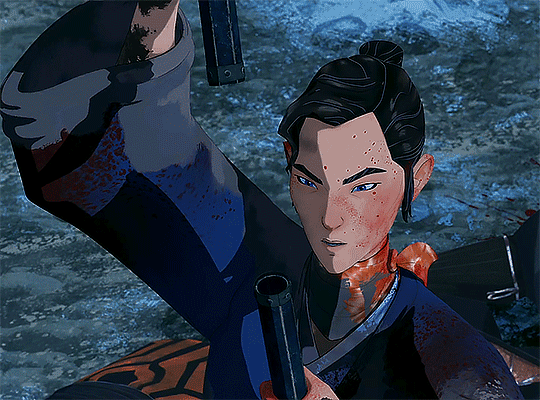
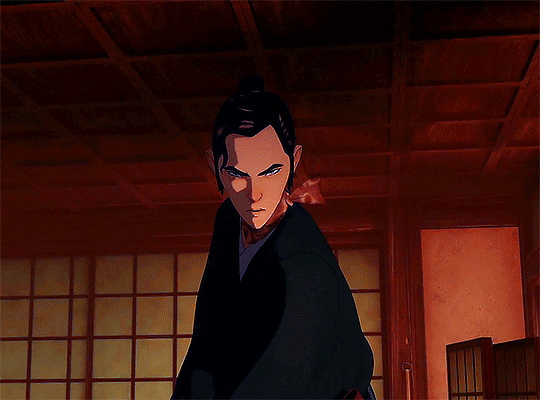
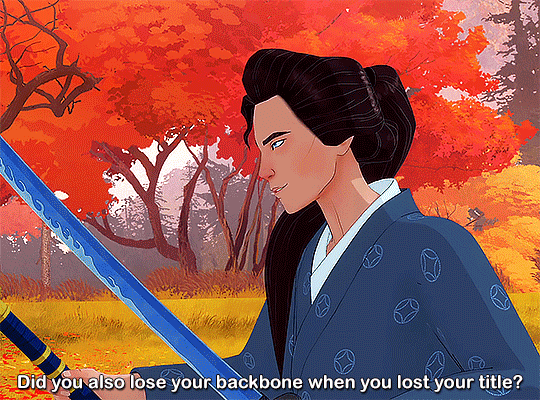
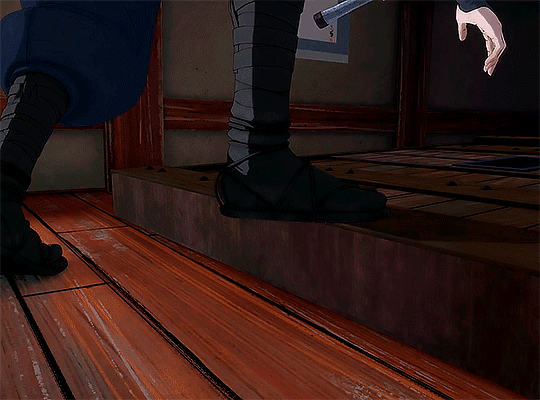


mizu in every episode: the tale of the ronin and the bride
I never said I was a samurai. You did. I am on the path of revenge. There's no place on it for love or friendship or weakness.
#blue eye samurai#besedit#blueeyesamuraiedit#mizu#animationdaily#animationedit#animationsource#netflixdaily#mine*#gifs*#mizuep
631 notes
·
View notes
Text

"Hate is like a typhoon. It begins as a breeze at the sea that is swallowed by darkness. Then deepens. Energizes and grows ever stronger. Swirling and raging until it's ready to strike.
But hate alone wasn't enough. It took one more ingredient: Love...
poisoned by betrayal, to bring so much bloodshed and woe to create the onryō."
-Blue Eye Samurai / The tale of the Ronin and the Bride (2023-)
怨霊
#I loved the series so much! 💙#my art#my fanart#blue eye samurai#Mizu#blue eye samurai fanart#mizu blue eye samurai#mizu bes#bes mizu#bes#bes fanart#mizu fanart#blue eye samurai mizu#onryō#onryo#yurei#Hokusai#quotes#netflix#netflix series#procreate#illustration#poster art#digital art#digital artist#artists on tumblr#first drawing of the year#first drawing of 2024#cheellart#cheella
494 notes
·
View notes
Text
Something cool about Blue Eye Samurai is how sex is juxtaposed with the end-goals.
I really love how our three protagonists are all obsessed. And that obsession defines them, torments them, and are subsequently reborn through their obsessions.
Mizu, of course, is obsessed with the concept of revenge. It's not even about getting even or getting justice as some might use to justify the bloody road taken—it is simply about seeking satisfaction for Mizu. She cuts a bloody swathe across Japan because of what the Four White Devils did to her mother and herself. She does not concern herself with the ramifications of her wrath but merely charges forward, leaving behind a trail of viscera and gore behind her.
Like I said before, her vengeance and obsession with satisfaction is not painted by the show as wrong. It is how she allows it to affect others along the path. It's why the episode with Madame Kaji is so enlightening; Mizu should not tackle this quest as a vengeful revenant; an onryō. She has let the world define her as a monstrosity and so she embraced it, when Swordfather and Madame Kaji knew what the correct path was to satiate her need for vengeance. Treat her sword as the Artisan's tool it truly is. Treat her body the way an Artist would treat their canvas.
Madame Kaji and Swordfather are both outcasts, for being a woman and a blind man. Yet they found strength in their exclusion, becoming single-minded in their fields of art. Because sex is art and swordsmithing is art. It's what makes Mizu's body writing scene so fucking good.
Artistic vision becomes stagnant when one pulls from only one source. They become rigid and unbending when Mizu, like her namesake, must be fluid. She has shown fluidity in her use of her gender and her morals, but cannot apply that same flexibility towards her goal. Throughout season one, she was becoming an uninspired artist, merely painting the world in hues of scarlet. In a world that forces Women to be either Wives or Whores, Mizu chose to be a Warrior—but a warrior fights for a cause, whether it be just or otherwise. A soldier fights in an army. Mizu is neither of these things. She is an Artist first and foremost, and her medium is Death. Sex, something Mizu was at first hesitant before her failed marriage, and something she actively avoided afterwards, is what gives her a new perspective. Like an Illustrator studying life to better draw their intended worlds, taking inspiration from wherever one can find it.
Taigen and Akemi are also equally affected by the artistry of sex, as befitting of Mizu's fellow protagonists.
Akemi is quite obviously Mizu's narrative foil. Mizu chases after revenge like a bloodhound whereas Akemi longs for freedom like a bird in a cage. Both are fierce women who are unsatisfied with their lot in life, with their sex and gender being used against them in their lives. Literally, the episode "The Tale of the Ronin and the Bride" is a fucking triple entendre:
Mizu is the Ronin as well as the Bride.
The play showcases the tale of the Ronin and the Bride.
It is also Mizu as the Ronin and Akemi as the Bride.
And when Mizu finds her center as she melts down her blade and engages in body writing, this scene of enlightenment is juxtaposed with Akemi laying with her new husband Takayoshi. Both, in this moment, are taking control of their lives through sex. They are both taking control of their futures through the ways Madame Kaji taught them. Mizu and Akemi are both rebels against this oppressive society, and are both talented artists with their body. Whether that be sex, politicking, or ass-kicking.
Taigen, like the two women before, finds freedom through it but in a more subtle manner.
Where Mizu and Akemi are narrative foils, both using sex as a form of art and escape, Taigen finds liberation through his awakening.
Like the closeted bisexual man he is, he begins his journey of self-realization when he first encounters Mizu at the Dojo.
Every single battle these two have is purposefully rife with sexual tension. All his life, Taigen has been taught that a man must live with honor. That he must take control of his life and his identity, or he will have failed and that he is better off dead than to live with such shame.
Taigen is just as much a victim of the Patriarchal society around him. Mizu rails against it violently. Akemi seeks to run away from it all. And Taigen, with the privilege given to him by his manhood, chooses to become a perpetrator, enabling the vicious wheel of society to keep moving forward.
His obsession with honor leads him to hunting down and even protecting Mizu. Mizu is no doubt the better warrior, but even she knows she owes so much to Taigen. The blockhead not only did everything to protect her in the valley, but also sealed his lips shut even under the duress of torture. His obsession with honor becomes an obsession with Mizu.
His regrets over tormenting her over her looks and ethnicity as a child. His shame in having lost so decisively in his own dojo. Taigen was a man born with nothing and climbed up to the top with every advantage he could muster, and suddenly it's all ripped away by this one vengeful spirit passing by.
Taigen learns to surrender control around Mizu. He begins to discover his own sexuality and purpose around Mizu, redefining what honor really means to him now that he, as a man, has a budding attraction towards the man who beat him.
Mizu's Vengeance. Akemi's Freedom. Taigen's Honor. In all three, Sex becomes a catalyst in redefining what each of these concepts truly mean to them all. It's not just sex of course, but it is undeniable how the writers keep juxtaposing sexual acts and thoughts with massive character moments.
It changes how Mizu chases after her Vengeance. It recontextualizes how Akemi can be Free. It showcases the absurdity of the Honor forced upon Taigen.
It's so fucking refreshing seeing Sex not used as fanservice or shoe-horned in just to further a stale, poorly written cis-heterosexual romance; but used as a plot point that cannot be ignored. An impetus that fuels the narrative.
Moving forward, I'm curious as to how sex will be used.
The next few ideas aren't as sound or organized because I'm neither Asexual nor Genderfluid, so please if anyone reads this who understands it better, feel free to point it out.
I think it'd be cool if Mizu met the inverse of Madame Kaji. A person who is apathetic to sex. Sure, Swordfather has shades of this, but I'm tired of the person with disabilities also being on the Asexual spectrum. And I'm not saying that Ace or Graysexual people with disabilities don't exist! But they always tend to be written as having some form of disability (Varys from ASOIAF) or a Robot.
Just as artists need a variety of sources to pull inspiration from, I hope in the next seasons we get to see different perspectives on sex and gender. In London, it feels like Mizu finding the other half of herself, and with that having a better way of tackling her own identity. Whether it be gender, sex, combat, etc.
Basically what this inane rambling amounts to is that Blue Eye Samurai tackles sex and violence and revenge and obsession in ways that most media has yet to truly do. So that was pretty cool.
#blue eye samurai#blue eye samurai spoilers#blue eye samurai season 2#mizu#mizu blue eye samurai#akemi#taigen#metal#media analysis#character analysis#blue eye samurai meta#netflix are cowards for not announcing season 2 immediately#come on dickheads#the fans and the creators have been fighting for the green light#hand it over#you cocks#paprikash ramblings
562 notes
·
View notes
Text
one of the things I really love about Mizu's narrative in the The Tale of the Ronin and the Bride is just how deeply affected she is by her relationship with Mikio. When the bounty hunters come to the farm to collect her, she prepares the face them, and when she sees Mikio on the hill, she's excited and almost relieved to see him there. Not because she needs help with the enemy, but because she so desperately wants to be accepted by even one person, and Mikio is the first person to ever look at her with any kind of love or respect. that moment when he rides away from her is so bone crushingly devastating because that was the last straw, the poison of betrayal finally slipping into her life. No one else will ever look at her the way Mikio did, and even he thinks her a monster. The path to revenge is a lonely one, and Mizu had finally learned that lesson for good. It's very telling that when she does kill Mikio, it's blurred, almost off screen, because he matters so little to her at this point his death isn't worth her turning around.
155 notes
·
View notes
Text


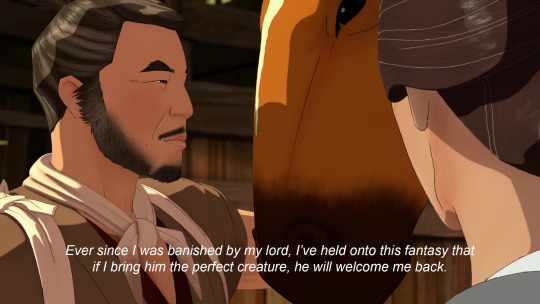
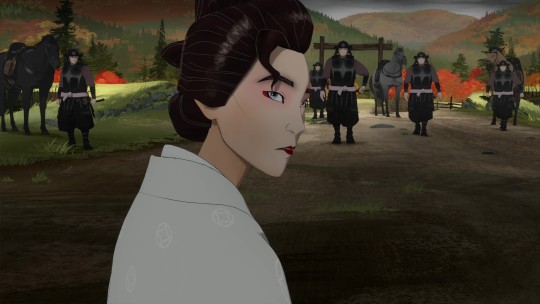

The Tale of the Ronin and the Bride
90 notes
·
View notes
Text
Episode 5- The Tale of the Ronin and the Bride
I need to analyze those scenes as a juxtaposition to each other because the symbolism is amazing.
"A storm is in his soul."
Akemi ended the last ep by saying that Mizu was just angry, and this ep shows how anger is one of the most destructive emotions one can have.

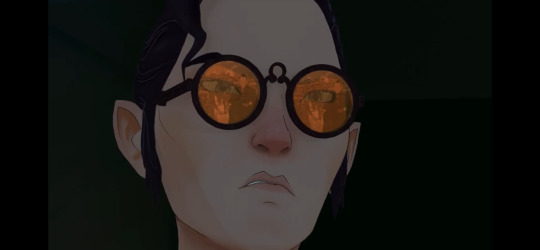
I wouldn't be going into every scene, just the ones with Mizu that I find interesting.
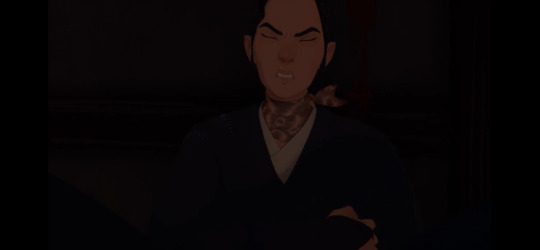
As Mizu gasps in pain in a quiet place before being attacked and winning (doing something she is very good at swordfigting) this scene is placed with her trying to be a "good" wife and failing. Being clumsy, scaring Kai, not being able to cook, etc.
Then Mikio and her have their first good conversation. About Kai, this "perfect creature."
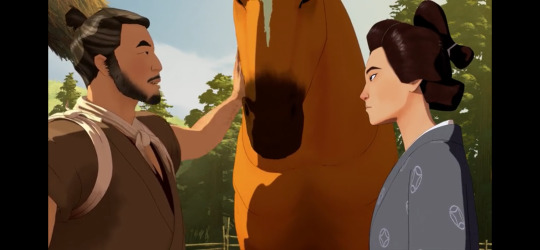
Their relationship seems good, almost, not romantic but good.
Mikio asks her if she can ride, then we go back to the present and see

Mikio initiates a date and she seems to relate this experience of starting to be open with a violent action.
"Although sometimes if he stopped to listen the ronin would still hear it calling his name."
The next scene is Mizu's 'mom' going out to get drugs, something that the white men brought into the country, and another way her life was ruined.
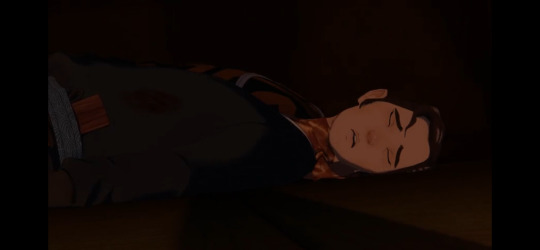

Mizu is knocked out, she is unconscious. She is at her most vulnerable and what does she associate that with?
Sleeping with her husband.
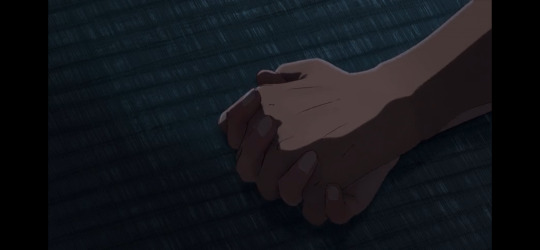
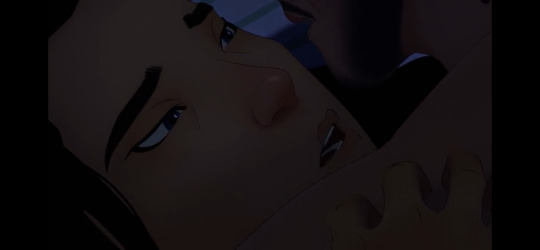

For her, that seems to be the same. Being at her most vulnerable.
which makes what happens next so very sad.
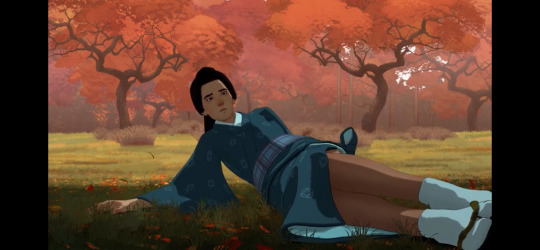
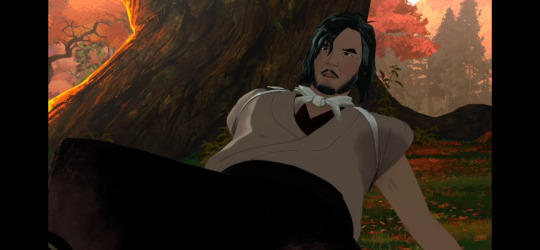
"You are a monster."
Mikio said to Mizu, ending their relationship and any hope of something more.
Mikio sells Kai, also symbolizing selling her.
Kai was the reason their relationship even got to that point. Kai also represents water like Mizu, another way Kai represents Mizu
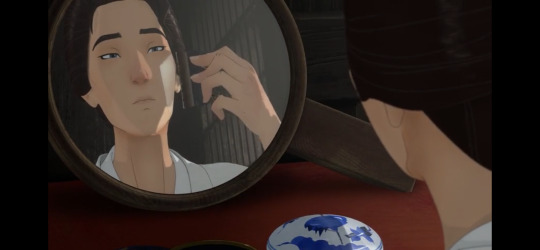

So Mizu gets dressed like a bride, putting on the makeup and the clothes all while she is actively being crushed.


and well if there was one good thing Mikio did was remind her that a naginata is great against an army, which she remembers well.
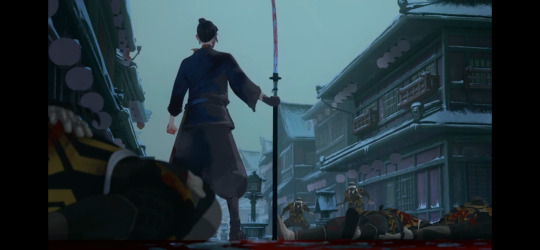
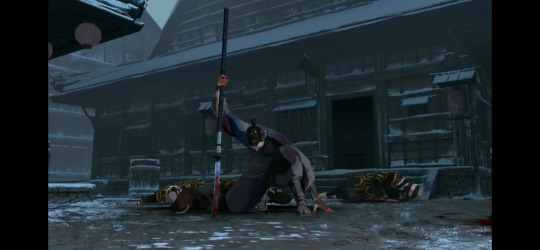
Also, Mizu's version of a naginata is the coolest thing I've ever seen
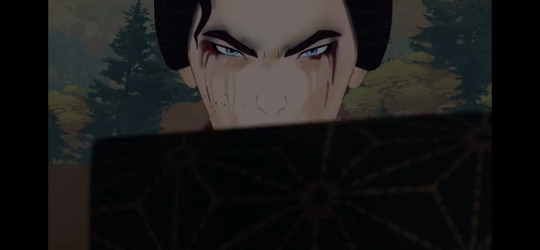
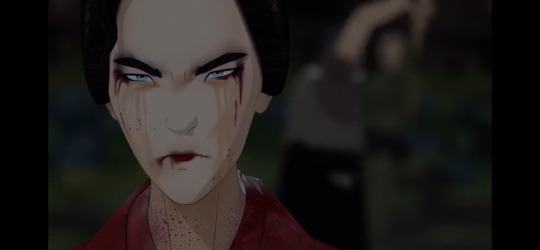

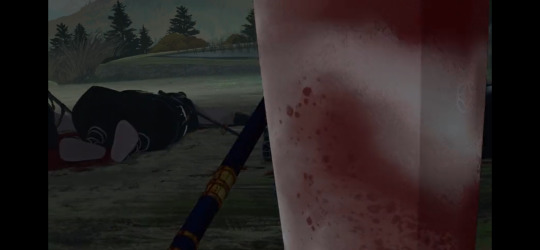
I think this was the moment she let go of friendship, love, and weakness. like she tells Ringo.
This ep was truly one of the best pieces of media I’ve ever seen. Mizu exploration of vulnerability, and how it makes her feel like she’s dying. The symbolism that plays off that. Literally and figuratively, emotionally and physically.
I wonder how much she thinks about this? does it happen every day because this really does seem like something she thinks about a lot
72 notes
·
View notes
Text
the tale of the ronin and the bride really changed the entire premise and promise of the show. because mizu really could've been happy. she WAS! she was happy. she fell in love and found peace and she was about to accept all of herself and openly be all of herself but then it was robbed from her.
and not to push my taimizu agenda again (sorry) but for taigen to behave the same way mikio did from the inevitable gender reveal would be so redundant in my opinion. it would be different if mikio didn't exist and that whole storyline didn't exist, but it does. so taigen won't need to play that role of "guy falls in love with mizu, only to find out mizu is a woman* who's insanely good at fighting, and then lashes out at her and destroys their relationship" anymore. someone already did that before him.
like! i was thinking about how taigen's reaction might mirror that of avigdor in yentl, which is the movie that inspired the love triangle in BES. so if you haven't watched yentl, basically it's about a woman named yentl who crossdresses as a man so she can study and go to school. at the school she befriends avigdor, who is just as passionate about her studies as she is and they basically become best friends who bond over their debates of rabbinic literature. yentl falls in love with him, and it's implied that avigdor also starts feeling that way for yentl, despite believing her to be a man. at the end of the story, yentl reveals herself to avigdor, and he lashes out at her for having "tainted" everything and for having made him a "sinner." he gets angry, there's an argument as he demands to know why she did it and why she is exposing herself now, and yentl ends up breaking down crying, confessing that she loves him. avigdor holds her and comforts her, confessing his mutual feelings towards her, and they kiss. and then they talk about running away together and eloping, but in avigdor's plans, yentl would have to be his wife and thus would no longer be able to do what she loves (study). so they end up parting ways and yentl leaves aboard a ship to find her own freedom.
so anyway, the parallels of yentl=mizu and avigdor=taigen are clear, but to me, it would be rather redundant if taigen were to try to force mizu into this role of a docile wife again. because that's what mikio tried to do! and mizu had done it, and was about to do it again. for a year she lived as a submissive wife and even began to enjoy it. and after sparring with mikio and him rejecting her masculine side, she put on her bridal robes and her makeup in hopes to apologise.
so whatever taigen's reaction will be, i think will definitely be a parallel to mikio's, but i think will end up contrasting it in the end (see: my taigen and mikio are narrative foils post)
i mean, definitely there will be conflict and drama though, about that there is no doubt. especially cuz we all know taigen is a huge drama queen, there's no way he WON'T make a big deal out of it—and this would be the case even IF he grows enough to be able to deal with all his conflicting feelings internally instead of lashing out. regardless, he won't be so accepting immediately, but i don't think he will outright betray her and be an antagonist again.
idk idk. i'm just having lots of thoughts about this now.
#taigen blue eye samurai#mizu blue eye samurai#blue eye samurai#taimizu#mizu x taigen#taigen's reaction might mirror li shang's more tbh sdkjddj#like he was upset and tried to ignore mulan but then in the end he still helped her#idk! im just yapping dont mind me#shut up haydar#fandom.rtf
152 notes
·
View notes
Text
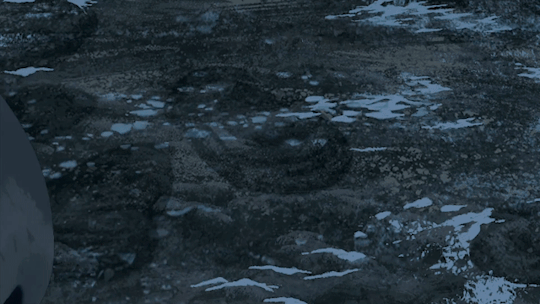





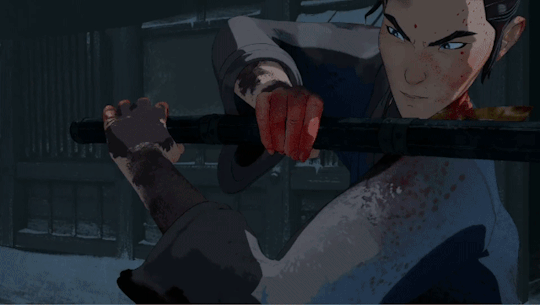
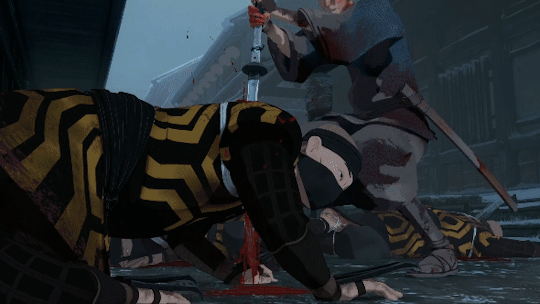
Blue Eye Samurai
Ep. 5 The Tale of the Ronin and the Bride
#blue eye samurai#blue eye samurai spoilers#mizu#building the naginata#legit my favorite sequence#blood#gore#violence#my gifs#reposting bc tumblr be like that sometimes
120 notes
·
View notes
Text
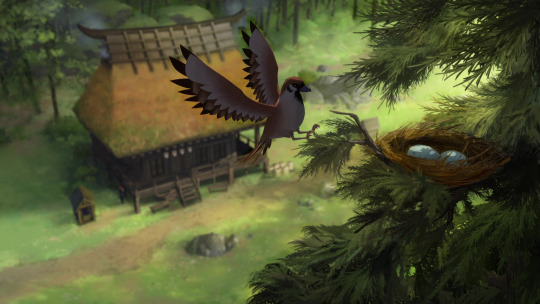

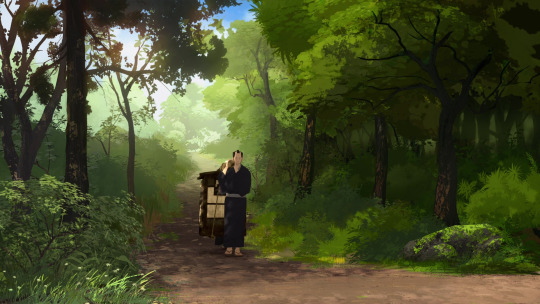
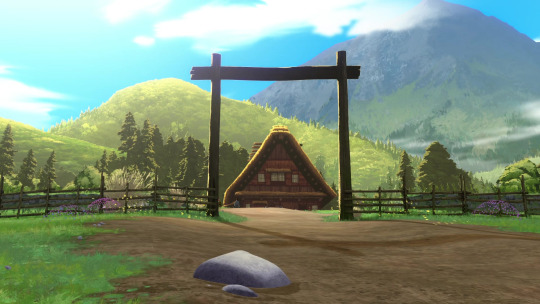
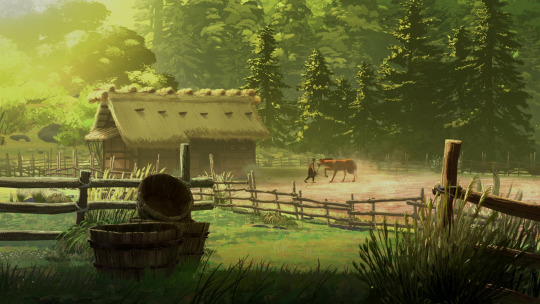

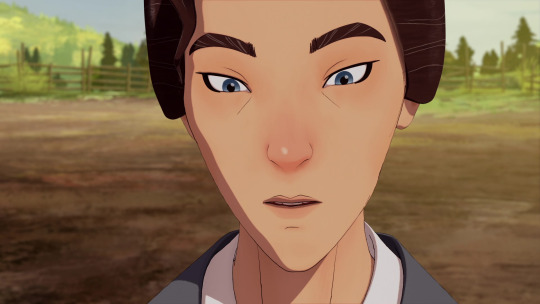
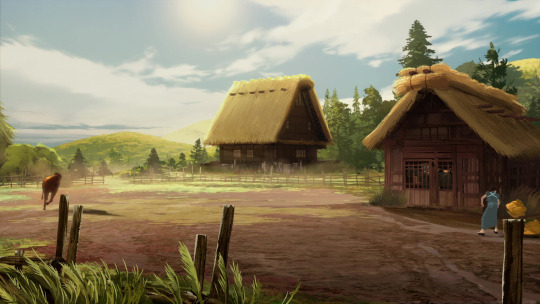









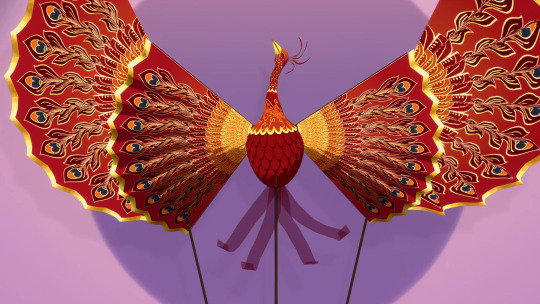
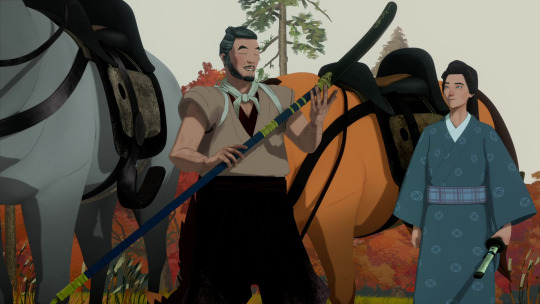


BLUE EYE SAMURAI (2023-)
Episode 5 | The Tale of the Ronin and the Bride
59 notes
·
View notes
Text
Blue Eye Samurai Thoughts
These thoughts are sort of scattered and don’t cover everything I think makes this show great but I wanted to get something out about this amazing show.

Every once in a while an animated project comes around that makes me sit back in awe that something this phenomenal was allowed to be made. That something this rife with creativity, care, and emotion was given the freedom necessary for the people behind the scenes to make an authentic experience that really pushes the boundaries of what animation can do. And Blue Eye Samurai did just that.
The last time I felt that way about an animated show was Arcane.
Blue Eye Samurai follows Mizu, a child of mixed race that was deemed a monster due to her parentage, and her journey to kill the man who sired her. It’s a dark, tragic tale that blends 2D and 3D animation to create a story that centers themes of prejudice, class, identity, found family, revenge, and loss.

It’s one of the most gorgeous shows to come out in the last few years. With pretty much the entire show having the ability to leave you breathless. The action scenes in particular are standouts (shocking I know).

In these action scenes the show really embraces the freedom its rating gives it without falling into the usual trappings shows with a mature rating tend to. Blue Eye Samurai has an abundance of bloody gore filled violence that never becomes gratuitous. It all feels purposeful and poignant within the story itself and how it explores its themes. It gives the consequences of Mizu’s revenge depth. Not just in how it effects the people around her and the collateral, but also in how the violence Mizu perpetrates effects her.
This is best explored in episode 5 (The Tale of the Ronin and the Bride), which is probably the best episode in the season, where we get to see a glimpse into Mizu’s past and how her path towards revenge is solidified.
The hopefulness of the past is directly juxtaposed with the bloody carnage of the present, while the story of the bride and the ronin is told over the course of the episode. There’s a foreboding that is layered over top of every scene in the past, the knowledge that in some way this goes wrong and leads Mizu to this point. To become this force of nature capable of cutting down men without hesitation.
It shows those parts of Mizu she’s lost through the hardships her life threw at her and those parts she’s been forced to discard herself to accomplish her goals.
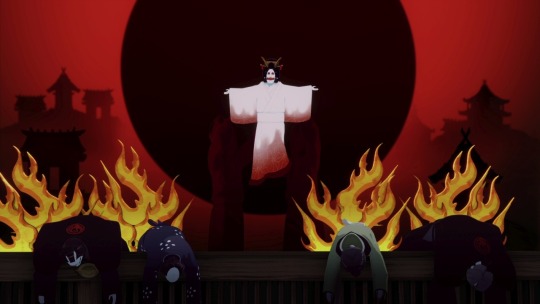
The loss brought on by the hardships her life threw at her is shown in the past with her mother and husband and their betrayal and death. And the parts of herself she’s had to discard is shown in the present when she initially spares the boy that turns her in and almost gets the women in the brothel and herself killed that she ultimately kills in the end when faced with the same choice.
This is all just scratching the surface of this exploration, but I think it gets across the point that this show does a good job of exploring the nuances of revenge and what led Mizu to this point.
It’s the show’s meticulous exploration of aspects of Mizu’s character that makes her such a complicated character and an amazing protagonist. I don’t know if anything I write would really do her justice, but the complexity and nuance of her character alone make this show worth watching.
The second most interesting character to me was Akemi.
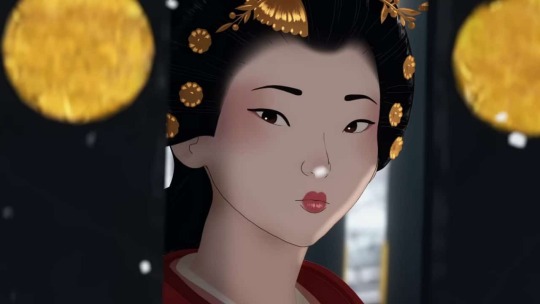
Akemi’s arc is incredibly compelling. She goes from feeling trapped and trying desperately to escape to learning how to use her cunning to try and become great. But because this arc is occurring in Blue Eye Samurai it isn’t as straightforward as that description makes it seem on the surface. That arc is flipped on its head and to show what I mean I want to look at the scene on the bridge.

That scene on the bridge after Seki dies was one of the most intriguing of the final episode. That moment you can see the shift in Akemi’s desires from that of freedom to that of greatness. In many ways this isn’t the victory that it should be.
The wording seems like that of someone taking control of their own destiny and deciding to pull themselves up to a position higher than anyone thought possible, but the framing with the city in flames behind her, the shogunate’s enemies burning alive, and Seki dead on the ground put it in a more tragic/sinister light.
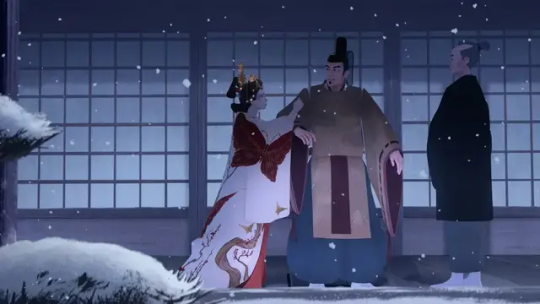
And those words she speaks that are on the surface sound triumphant echo sentiments that her father has said to her (telling him he’s only alive because of her and the belief that she can control the shogun, etc). Her desire for greatness even reflects his own.
This isn’t really freedom and considering the almost naive quest for that freedom she went through during the season and was even hopeful she could obtain just moments before, living out her days with Seki on his family farm, make this feel less a victory and more like she’s becoming what she has to. That she’s hardened. That she’s starting down a path that mirrors Mizu’s in some ways.
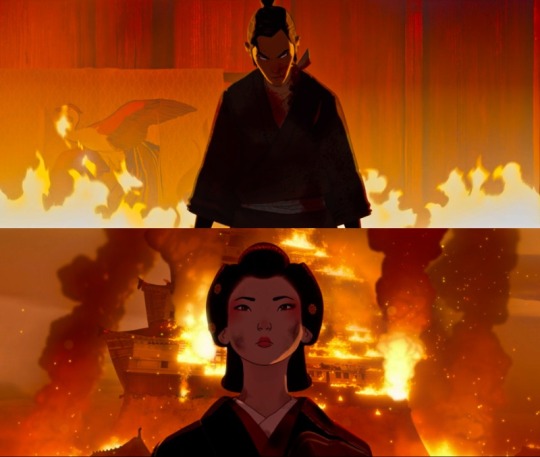
And this mirror between Mizu and Akemi is clearly intentional. The show itself visually mirrors the two within this same episode in the exact scene I was just talking about.
And throughout the season she is the most direct foil to Mizu. Both found different ways to try and work around the inherent restrictions being a woman in 1600s Japan would entail, to gain any semblance of freedom from those restrictions, but were ultimately hurt by those expectations/restrictions in a way that forced them to change.
They took how they handled it in two completely opposite directions (Mizu presenting as a man and Akemi using her sexuality and forced marriage to her advantage. In broad, over-simplified terms: rejecting femininity vs embracing it to achieve their goals) which is what makes them such interesting foils for one another.

This parallel/contrast to Mizu makes her the most interesting of the supporting cast and her end point puts her into what might be the most compelling spot out of all the main characters heading into next season.
(Plus she’s voiced by Brenda Song aka Anne Boonchuy and London Tipton)
Honestly all of the characters are given nuance that makes them at the very least entertaining.

The show even manages to make a character that could have just been comedic relief an interesting character and an avenue to expand on its exploration of themes with (season MVP) Ringo.
This is best shown through Ringo’s views of greatness. They at first seem shallow and naive. Not really looking deeper than the surface at what this idea entails and he floats from one thing to the next so easily that it can initially seem unfocused, but I think that’s the point. Ringo doesn’t really know what greatness is so his view of it is constantly changing and what he believes he can be great at is constantly changing too.

Just like the audience he is awed by Mizu’s strength and ability in battle, but as the brutality and reality of what that skill brings comes to light the idea that this skill and determination is greatness slowly dims. It never entirely dies out because this isn’t meant to destroy his idea of greatness, but instead change it from a black and white binary to something that is more blurred. He still sees greatness/potential for greatness within Mizu, but he doesn’t see her as the pinnacle anymore. The end all be all.

And what he can do to be great constantly changes because he’s suddenly had so many opportunities he never could have dreamed about, due to his disability and being stuck at his father’s noodle shop, opened to him that he needs the time to explore what he wants. He’s still trying to find his calling and by the end of the series he might have found the start of it in the same place that Mizu did– With Swordfather.

The one thing about Blue Eye Samurai that didn’t quite work for me is the use of music. The show’s score is beautiful and used to great effect, but the music it chose to put over scenes would pull me out of the moment almost every time because it used highly recognizable songs that I’d heard in so many pieces of media it felt inauthentic and jarring.
This is a small complaint because there are only 2 scenes where the music choice did this, but I felt I should mention it because of how important these scenes were supposed to be. The rest of the show easily makes up for this small gripe.
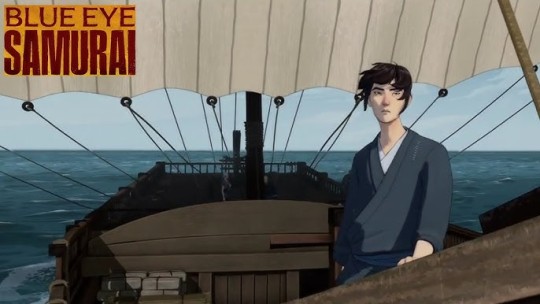
I could probably ramble about this show all day but I’ll cut this off here and say this: Blue Eye Samurai easily lives up to the hype that everyone has been giving it. It’s a visually stunning show with compelling characters that explores its themes in such depth that I can’t wait to see where it goes from here.
Random thoughts
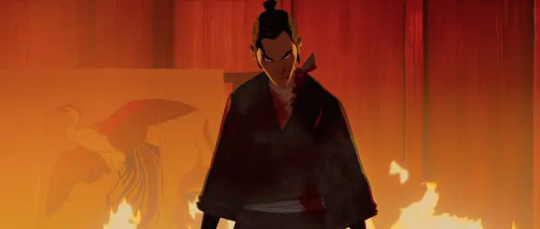
I love the shot of Mizu in The Great Fire of 1657 where she’s staring Fowler down, flames behind her and eyes a piercing blue, because of the perspective of this shot. This is shown through the eyes of Fowler, the man who just brought an army to the shogunate’s doorstep with the plan to take over Japan, and yet he’s afraid of Mizu and the lengths she will go to achieve her goals. It’s such a chilling shot that absolutely shook me to my core. (Man Blue Eye Samurai is amazing at these types of shots)
Taigen is a character that I had a lot of fun with, but didn’t make as much of an impression on me as the rest of the characters. He isn’t as complicated and compelling as Mizu and Akemi or as thematically interesting as (season MVP) Ringo. I wish I had more to say about him, but I don’t. I do think his dynamic with Mizu is interesting though.
Fowler is a really fun villain and I can’t wait to see how he plays off of Mizu now that he is going to be her guide in London. I can’t wait to explore those bombshells he dropped in the finale about Mizu’s origins.
The fights in episode 6 were the most visually stunning to me in the season. The way it played around with lighting and perspective was incredible.
I didn’t talk about it much above but I thought the way Blue Eye Samurai explored Mizu’s relationship to her gender to be very compelling and nuanced. The way it’s handled lends itself to a fascinating exploration of identity and gender that I think is important.
Swordfather has such a great relationship with Mizu. He knew she didn't leave his house the night before and just decides to adopt her and teach her everything he knows, giving her a stable relationship that doesn't reinforce her shame. He doesn't recognize her mixed heritage as a point of shame instead embracing her for who she is and letting her know that her mixed heritage doesn't make her impure, standing up for her when the bandit threatens to hit her and insults her origins. This genuine care is something Mizu desperately needed as a child and it was amazing to watch.
I think I want to go into greater depth at some point on my points on Mizu and Akemi being mirrors to one another and how The Ronin and the Bride explores violence and loss and how they're intertwined in Mizu's life at some point.
It’s shows like this that make me even more frustrated at Netflix. They were on such a role in animation and were (and sort of still are) a driving factor in changing the landscape of adult animation that they were frequently the platform that I was most excited to see new animated projects on, but then they absolutely gutted their animation division and showed little to no respect to the work of those that made the animated properties and I lost a lot of respect for them as a result. I really hope projects like Blue Eye Samurai keep being made and that platforms start respecting animation like it deserves.
I kind of feel like adding a few adult animated recommendations on netflix to this so here goes: Arcane (duh. It’s a masterpiece), Pluto, Cyberpunk Edgerunners, Castlevania, Carol and the End of the World, Skull Island, Inside Job, and Tear Along the Dotted Line.
#blue eye samurai#netflix#mizu#akemi#ringo#swordfather#taigen#season 1 was phenomenal#the ronin and the bride#I really loved this show#watch it immediately#spoilers below the cut
58 notes
·
View notes
Text
I was deep in my drunk feelings when I made a joke post threatening to write about episode 5 symbolism and mizu, but then enough people said "where is the essay" so I am here to ramble as requested
in ep 5, the tale told in the puppet show spliced with the flashback sequence of mizu’s marriage identifies mizu as not only the ronin, but also the bride and, with tragedy, the onryō. I would argue that mizu is also depicted (in a less linear fashion) as the phoenix itself, and will circle back to this thought later
mizu is first presented as the ronin, the warrior with a singular purpose. as the ronin’s lord is assassinated by the rival clan, mizu’s mother is killed in the house fire. the ronin swears his revenge, and dedicates his life to this cause. through his childhood and into his young adult life when he departs from swordfather, mizu is exclusively the ronin. he is not the onryō yet, demonstrated in his honorable unwillingness to harm the men who stab him and throw him out of the shop even after he insists that he wasn't looking for a fight in the first place
the ronin is only able to rest and put away his mission when he meets the bride, the lover. however, mizu’s bride is not literally another person she meets. the bride is not mama, or mikio, but the lover mizu discovers in herself, the one allowed to bloom in place of mizu-as-ronin. mizu’s growth into the bride from the ronin occurs over time, but solidifies in the moment when kai is gifted to her by mikio, paralleling the taming of her own distrust and expectations of being hurt. (side note, giving a nod to effective use of color: the bride puppet, dressed in reds and oranges, has matching coloring to the gifting scene, as it takes place in autumn)
mizu’s transformation into the onryō happens in two parts, beginning with the slaying of the bride and completing with the slaying of the ronin. the betrayal by mikio and mama kills the softness in mizu, kills the lover she has allowed herself to become. mizu-as-onryō retaliates by killing the ronin: the part of himself that hesitates before striking, that part that cares for honor. in not intervening in mama’s death and then murdering mikio in turn, mizu kills the ronin in himself, slaughtering it in retribution for the dead bride
mizu is both the bride and the ronin, peaceful lover and noble warrior, until he is not—he is the onryō, only the onryō. episode 5 opens with the narrator saying, “no one man can defeat an army, but one creature can.” only as the onryō, and not as the ronin or the bride, does mizu have the force of will and capacity for violence it takes to singlehandedly overcome boss hamata’s thousand claw army and protect the brothel
mizu’s identity and place in the world is a constant dialogue. he is too white to have a respectable place in japanese society, but is also seen by abijah (our stand-in for white british society) as filthy and corrupted. he is not perceived as enough of a man to walk through life wholly as one (madame kaji’s comments about his apparent lack of sexual desires, his bones breaking “like a woman’s” under fowler’s hands, his disregard for honor and recognition as a samurai). she is also not enough of a woman to exist peacefully as one with mikio (she is a swordsman, an accomplished rider, bad at domesticity; “what woman doesn’t want a husband?” mama chastises)
the moment when mikio rejects her completely following their spar is a particularly poignant narrative beat about tolerance of “the other” in gender presentation: mikio can accept her as a woman only until she bests him at manhood, at the sword, at violence. she is Other in that she is physically strong, a poor cook, able to wield a sword. these traits are all tolerable to mikio, also an outcast, so long as she is not so Other as to be a man. but her swordsmanship bests his, and bests his in the way the sun outshines a candle. it is too Other, and therefore she is not a woman. she is a monster to him, the onryō, even before she kills the bride and the ronin in herself
(( as an aside, this series does a very good job at discussing the oft-challenging relationship between race and gender (e.g. that it is difficult for mizu to live as a biracial man, but would be deadly for her to live as a biracial woman), and demonstrating how queerness of identity complicates that relationship even further—but that’s a topic for a different post ))
as the narrative has been building on this idea that mizu is both the ronin and the bride, the man and the woman, japanese and white, episode 5 concludes with the heartbreaking reveal that, although mizu is all of these things simultaneously, he has had these identities beaten out of him by tragedy and cruelty and his own self-loathing hand
but mizu does not stagnate as the monster. we return to the metaphor of steel: too pure and it becomes brittle, breaking under pressure. mizu is a sword, a weapon that he has forged for the sole purpose of revenge and blood, but he has excised too much of himself to successfully deliver on his goals—he is not the ronin or the bride, he is the onryō; she is not a woman or a man, she is the onryō; the onryō is nothing but pain and vengeance—and so it breaks
“perhaps a demon cannot make steel,” mizu says. “I am a bad artist”
swordfather replies, “an artist gives all they have to the art, the whole. your strengths and deficiencies, your loves and shames. perhaps the people you collected… if you do not invite the whole, the demon takes two chairs, and your art will suffer”
to be reforged, mizu must not only acknowledge the impurities she has beaten out of her blade, out of herself, but lovingly, radically accept them and reincorporate them into the blade, into herself. he adds impure steel—the people he has collected, with their own dualities—to the sheared meteorite sword: the broken blade that fit so perfectly in taigen’s hand (the archetypal ronin, but a man seeking happiness over glory), the knife akemi tried to murder mizu with (the archetypal bride, but with ambition for greatness), the bell given to ringo and returned to mizu in broken trust (the man unable to hold a sword, but upholding samurai principles of honor and wisdom), the tongs that honed mizu’s smithcraft under swordfather’s guidance (the artisan, a blind man who sees more than most). to make of herself a blade strong enough to see her promises through, she must hold her monstrosity and honor and compassion and artistry in equal import
she is the onryō, and the ronin, and the bride, and all the people she has collected.
with this we finally come to mizu as the phoenix. mizu undergoes many cycles of death and rebirth, both in the main storyline and the flashbacks into her life leading up to the present. often, mizu is juxtaposed against literal flames—the burning of his childhood home, swordfather’s forge, the fire as he battles the giant in the infiltrated castle, the heart sutra forge of her own making, the climactic second confrontation with fowler. not every death/rebirth mizu undergoes is thematic to flame, of course. the fight with the four fangs, spliced with the rebirth ceremony of the town, for example, or the deaths of her ronin-self and bride-self, giving rise to the onryō
he is the phoenix, unable to truly die: every fatal combat he pulls back from the brink, reborn over and over in the wake of failure and setback. in episode 1, mizu prays for the gods to “let [him] die.” not to help him to face death unafraid, not to die with honor or victory, but to die at all. mizu has experienced death a thousand times over, but not once has it stuck
(( as a parting aside: the ronin’s rage at the phoenix clan for killing his lord parallels mizu’s self hatred of his mixed heritage (which he believes to be the thing that killed his mother), and so the ronin’s quest for revenge against the phoenix clan is mirrored in mizu’s quest to kill the white part of himself as best he can, by killing the white men who could be his father ))
mizu, the ronin. mizu, the bride. mizu, the onryō. mizu, the phoenix.
#blue eye samurai#mizu blue eye samurai#hopefully this is mostly coherent#I have more things to say but this was getting lengthy#there's also a lot of gender and racial nuance I've glossed over here for an attempt at brevity and structure#god also the COLOR. do you know how much I have to say about the use of color and shadow as a reflection of the narrative#maybe I'll write another damn essay who knows#this show really scratches the part of my brain that was academically trained in film analysis#blue speaks
146 notes
·
View notes